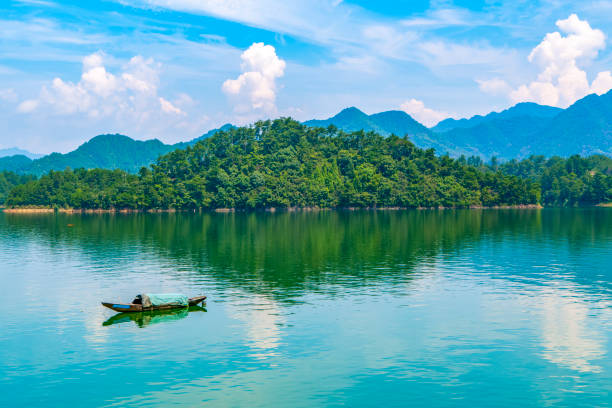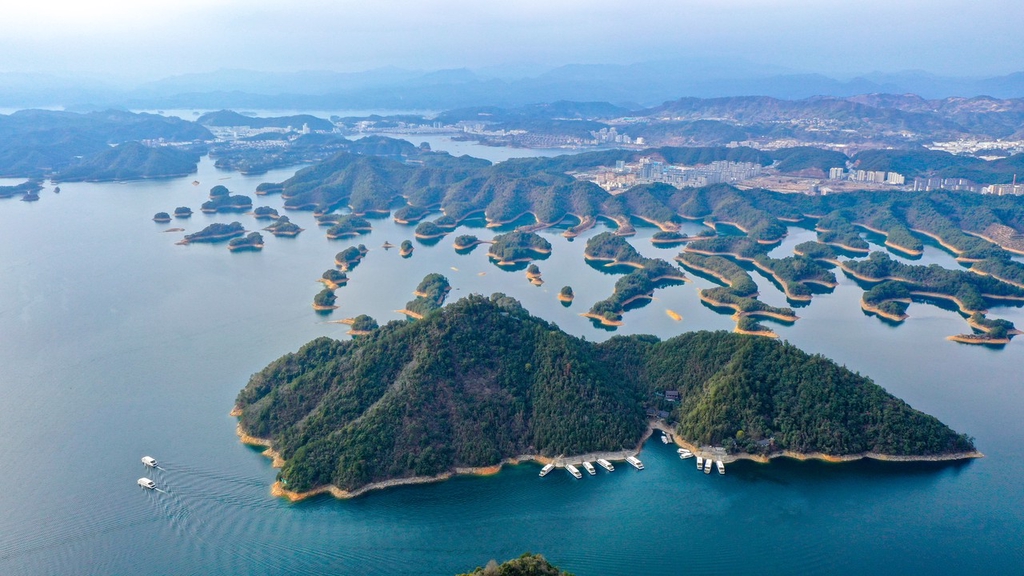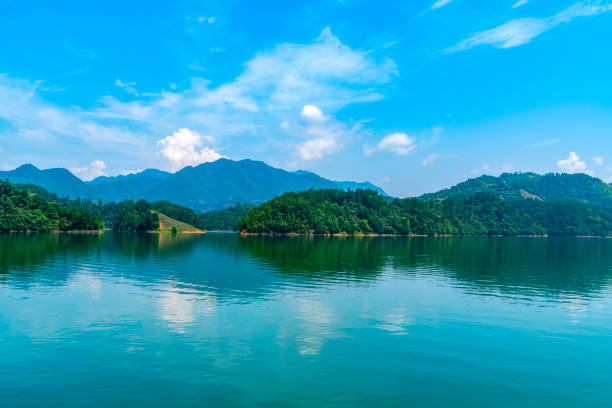Qiandao Lake Travel Tips: How to Make the Most of Your Visit

An Essential Guide to Visiting Qiandao Lake
Nestled in the verdant embrace of Zhejiang Province, Qiandao Lake—also known as Thousand Island Lake—offers a mesmerizing escape from the bustling cities of China. This stunning man-made paradise, created by the Xin’an River Dam in 1959, boasts over 1,000 emerald islands dotting its crystal-clear waters, making it a visual masterpiece that captivates all who visit. With its lush landscapes, rich biodiversity, and a unique blend of tranquility and adventure, Qiandao Lake is a sanctuary for nature lovers, photographers, and those seeking a serene getaway.
As one of the first man-made lakes to be recognized as a UNESCO Biosphere Reserve, Qiandao Lake is not only a testament to human ingenuity but also a thriving ecosystem that protects a wealth of endemic species. The lake’s pristine environment is perfect for a variety of activities, from kayaking through secluded coves to cycling along scenic trails that wind through bamboo forests and past cliffside vistas. Whether you’re indulging in the local culinary delight of fish head soup or simply soaking in the breathtaking views from a mountain peak, each moment spent here is a chance to connect with nature and experience the rich cultural tapestry of the region.
With easy access from major cities like Hangzhou and Shanghai, Qiandao Lake beckons international travelers to discover its enchanting beauty and charm. Whether you’re planning a quick weekend getaway or an extended stay, the lake promises unforgettable experiences at every turn. So pack your bags and prepare to immerse yourself in one of China’s most picturesque landscapes—Qiandao Lake awaits!
In This Guide
- An Essential Guide to Visiting Qiandao Lake
- The Rich History and Legends of Qiandao Lake
- Main Highlights: What You Absolutely Can’t Miss
- Planning Your Visit: A Practical Guide
- Tickets: Prices, Booking, and Tips
- How to Get There: A Complete Transportation Guide
- Local Cuisine and Accommodation Nearby
- Frequently Asked Questions
- Final Thoughts on Your Trip
The Rich History and Legends of Qiandao Lake
Nestled in the verdant landscapes of Zhejiang Province, Qiandao Lake, or Thousand Island Lake, is not just a marvel of nature but a tapestry woven with rich history and intriguing legends. This man-made reservoir, created by the construction of the Xin’an River Dam in 1959, has transformed the region into a stunning aquatic wonderland, featuring over 1,000 emerald islands. Yet, beyond its breathtaking vistas lies a narrative steeped in time.
Before the dam’s construction, the area was home to the ancient city of Xin’an, a bustling hub known for its vibrant culture and historical significance. The city, along with numerous villages and temples, was submerged under the lake’s waters, leaving behind a submerged history that continues to captivate visitors today. Remnants of the old city, including the ruins of temples and pagodas, occasionally resurface during drought seasons, offering a poignant glimpse into what once was.
Local legends add a mystical layer to Qiandao Lake’s allure. One of the most popular tales is that of the “Dragon King,” a deity believed to reside in the lake. It is said that the Dragon King protects the waters and the creatures within, ensuring the harmony of nature. According to folklore, fishermen would often leave offerings at the water’s edge, seeking the Dragon King’s blessing for a bountiful catch.
Additionally, the lake’s organic “tunac” fish, known for its unique flavor, is steeped in local lore. The fish is said to have grown large and flavorful due to the natural plankton found in the lake, nourished by the surrounding forests, which are considered sacred by the local communities. Annual festivals dedicated to the “tunac” fish celebrate both the culinary heritage and the legends surrounding this prized delicacy, drawing food lovers from near and far.
As you explore Qiandao Lake, you may come across tales of the “Nine Dragons,” a legend that speaks of nine sacred peaks encircling the lake, each representing a different dragon. These peaks are said to protect the land and its inhabitants, making the area a sanctuary of peace and tranquility.
Today, Qiandao Lake stands not only as a stunning destination for outdoor enthusiasts and nature lovers but also as a cultural landmark that preserves the stories of its past. Visitors are invited to venture beyond the surface beauty, discovering the layers of history and myth that continue to shape this remarkable place. Whether it’s through a leisurely boat ride, a hike to the scenic overlooks, or simply enjoying the local cuisine, the spirit of Qiandao Lake and its legends beckons, promising an unforgettable journey through time and nature.

Qiandao Lake.
Main Highlights: What You Absolutely Can’t Miss
When planning your visit to Qiandao Lake (千岛湖), you’ll discover a stunning blend of natural beauty, outdoor activities, and cultural experiences. Here are the main highlights that you absolutely cannot miss:
Scenic Areas
-
Central Lake Area
This is the most popular section of Qiandao Lake, known for its stunning views and cultural sites. Spend your day exploring lush forests, picturesque islands, and serene waters. Don’t miss the famous Meifeng Island, where you can hike to the summit for a breathtaking panoramic view of the lake and its emerald islands. If you prefer a leisurely experience, take the cable car to the top. -
Southeast Lake Area
Known for its tranquil ambiance, this area offers the perfect backdrop for relaxation and photography. The gentle ripples of the lake and the lush greenery create a serene environment, ideal for unwinding and soaking in the sights. -
Fuxi Stone Forest
For those intrigued by unique geological formations, the Fuxi Stone Forest offers a mysterious landscape of stone pillars and formations. It’s a lesser-known gem that provides a great opportunity for exploration away from the crowds.
Outdoor Activities
-
Water Sports
The clear, tranquil waters of Qiandao Lake are perfect for kayaking and paddleboarding. Rent a kayak to glide through the coves and islands, immersing yourself in the beauty of the surroundings while keeping an eye out for the native wildlife. -
Cycling Trails
Qiandao Lake boasts over 200 kilometers of biking trails, recognized as “China’s Best Cycling Route” by Lonely Planet. Rent an e-bike or a traditional bicycle and explore the scenic Thousand Peaks Loop. This trail combines bamboo forests with cliffside vistas, offering scenic rest stops along the way. -
Fishing and Culinary Delights
Experience the local fishing culture and savor the renowned Tunac Fish Head Feast. The bighead carp, known for its rich umami flavor, is prepared using ancient recipes and is a must-try during your visit. Visit during the annual Fish Head Festival for a true culinary celebration.
Cultural Experiences
-
Local Villages
Venture into the nearby villages to immerse yourself in the local culture. The traditional Huizhou architecture and warm hospitality of the locals provide a unique insight into the region’s heritage. -
Photography
With over 1,000 islands framed by crystal-clear waters, Qiandao Lake is a photographer’s paradise. Capture the stunning landscapes during sunrise or sunset when the light casts a magical glow over the lake.
Accessibility
- Convenient Location
Qiandao Lake is easily accessible, with high-speed trains connecting it to major cities like Shanghai and Hangzhou. With just a one-hour train ride from Shanghai, you can quickly find yourself in this oasis of tranquility.
Luxurious Stays
- Lakeside Resorts
Indulge in a luxurious stay at one of the many five-star resorts around the lake. From underwater suites at InterContinental to cliffside villas at Aman, these accommodations offer breathtaking views, private docks, and gourmet dining experiences.
Every corner of Qiandao Lake is filled with stunning sights and enriching experiences, making it a perfect destination for nature lovers, adventure seekers, and those looking to unwind amidst breathtaking landscapes. Enjoy your journey through this captivating lake paradise!

Qiandao Lake.
Planning Your Visit: A Practical Guide
When planning your visit to Qiandao Lake (千岛湖), also known as Thousand Island Lake, it’s essential to prepare for an experience that blends stunning natural beauty with rich cultural heritage. This practical guide will help you navigate your journey to this breathtaking destination in Zhejiang Province, China.
Getting There
By Air and Train
The nearest major airport is Hangzhou Xiaoshan International Airport, approximately 180 kilometers from Qiandao Lake. From the airport, you can take a taxi or shuttle to Hangzhou Railway Station, where you can catch a high-speed train directly to Qiandao Lake Station. The train ride takes about 40 minutes from Hangzhou and about 1 hour from Shanghai, making it a convenient option for international travelers.
By Road
If you prefer to drive, the journey from Hangzhou or Shanghai offers scenic views, especially as you approach the lake. Several car rental services are available, and it’s recommended to have a GPS or a reliable map app, as signage may not always be in English.
Best Time to Visit
Qiandao Lake is a year-round destination, but the ideal times for visiting are during the spring (April to June) and autumn (September to November) when temperatures are moderate, and the scenery is at its most vibrant. Summer can be hot and humid, while winter might bring cooler temperatures, but it’s perfect for those who enjoy a quieter experience.
What to Expect
Opening Hours and Ticket Prices
Qiandao Lake is open 24 hours a day, allowing you to explore at your own pace. Entrance tickets cost CNY 130 per person from March to November and CNY 110 from December to February. It’s advisable to purchase tickets in advance, especially during peak seasons.
Where to Stay
Accommodations around Qiandao Lake cater to a range of budgets. For luxury, consider the InterContinental’s underwater suites or Aman’s cliffside villas, both offering breathtaking views and high-end amenities. If you’re looking for something more budget-friendly, eco-lodges featuring traditional Huizhou architecture can provide a cozy and authentic experience.
Things to Do
Explore the Lake Areas
Qiandao Lake is divided into several areas, with the Central Lake Area and Southeast Lake Area being the most popular. Each area offers unique attractions, such as the stunning Meifeng Island, where you can hike or take a cable car to enjoy panoramic views.
Cycling and Boating
The area boasts over 200 kilometers of lakeside cycling trails, renowned as “China’s Best Cycling Route.” E-bike rentals are available, ensuring that everyone can enjoy the scenic rides. Additionally, boating is a great way to see the lush islands scattered throughout the lake.
Culinary Experiences
Don’t miss the chance to try the local specialty, the “Tunac” fish head soup, made from bighead carp. This dish is prepared using secret recipes passed down through generations and is a highlight for many visitors.
Travel Tips
- Language: While English is not widely spoken, many signs in tourist areas are bilingual. Downloading a translation app can help bridge any communication gaps.
- Local Etiquette: Respect local customs and traditions. A friendly smile and basic greetings in Mandarin can go a long way in enhancing your interactions.
- Cash and Payments: While major hotels and some restaurants accept credit cards, it’s advisable to carry cash for smaller establishments. Mobile payment apps like WeChat Pay and Alipay are widely used, but you may need a local bank account to use them.
Conclusion
With its stunning landscapes, rich cultural experiences, and delicious culinary offerings, Qiandao Lake is a must-visit destination in China. By planning ahead and following this guide, you’re sure to have a memorable adventure in this picturesque part of Zhejiang Province. Whether you’re hiking, cycling, or simply soaking in the views, Qiandao Lake promises an experience that will stay with you long after your visit.

Qiandao Lake.
Tickets: Prices, Booking, and Tips
Planning a visit to Qiandao Lake (千岛湖) is an exciting endeavor, and understanding the ticketing process is essential for a smooth experience. Here’s everything you need to know about ticket prices, booking options, and helpful tips for your adventure to this stunning destination in Zhejiang, China.
Ticket Prices
- Standard Admission:
- CNY 130 per person (March to November)
- CNY 110 per person (December to February)
These prices allow you to explore the breathtaking landscapes and numerous activities available around the lake.
Booking Your Tickets
Tickets for Qiandao Lake can typically be purchased on-site at the main entrance. However, for added convenience and to avoid potential queues, consider booking your tickets in advance through various online platforms or travel agencies that specialize in tours to Qiandao Lake. Many offer customizable packages that can include transportation, guided tours, and accommodation.
Tips for a Smooth Experience
-
Travel During Off-Peak Hours: If possible, visit on weekdays or during off-peak seasons to enjoy a quieter experience. This allows you to fully appreciate the beauty of the lake without the crowds.
-
Plan for Weather Variability: Qiandao Lake experiences different weather conditions throughout the year. Check the weather forecast before your visit and dress accordingly, especially if you plan to hike or explore the scenic areas.
-
Explore the Different Areas: Qiandao Lake is divided into several areas, each offering unique experiences. The Central Lake Area and Southeast Lake Area are particularly popular and well-developed. Allocate at least a day for exploration to make the most of your visit.
-
Consider Guided Tours: If you want to enrich your experience, consider joining a guided tour. Local guides can provide insights into the history and culture of the lake, making your visit even more meaningful.
-
Bring Cash for Local Purchases: While many places accept digital payments, it’s wise to carry some cash for small purchases or local vendors around the lake.
-
Enjoy Local Cuisine: Don’t miss the opportunity to try local delicacies, especially the famous fish head soup made from the lake’s freshwater fish.
By keeping these ticketing details and travel tips in mind, you’ll be well-prepared for an unforgettable experience at Qiandao Lake. Enjoy the serene waters, lush islands, and the myriad of activities that await you!
How to Get There: A Complete Transportation Guide
Getting to Qiandao Lake is a journey that unveils the scenic beauty of Zhejiang Province, making it an adventure in itself. Whether you’re starting from major cities like Shanghai, Hangzhou, or even further afield, here’s a comprehensive guide to ensure your trip to this stunning destination is seamless.
By Air
The nearest major airport to Qiandao Lake is Hangzhou Xiaoshan International Airport (HGH), which is approximately 140 km away. From here, you can choose your next mode of transportation:
-
By Train: Take a high-speed train from Hangzhou East Railway Station to Qiandao Lake Station. The train ride typically lasts around 40 minutes, and there are multiple services throughout the day. Upon arrival, taxis are readily available to take you to various resorts around the lake.
-
By Bus: Several bus services operate from Hangzhou to Qiandao Lake, offering a more budget-friendly option. The journey may take about 2 to 2.5 hours, depending on traffic.
-
By Car: If you prefer driving, you can rent a car at the airport. The drive will take approximately 2 hours via the G56 Hangzhou Ring Expressway and S203 provincial road. Navigation apps like Baidu Maps or Amap are recommended for the best routes.
By Train
If you’re traveling from Shanghai, you can easily access Qiandao Lake via high-speed trains.
-
Shanghai to Hangzhou: First, take a high-speed train from Shanghai Hongqiao Railway Station to Hangzhou, which takes about 1 hour. Trains run frequently throughout the day.
-
Hangzhou to Qiandao Lake: After reaching Hangzhou, transfer to a high-speed train to Qiandao Lake Station. This leg of the journey takes around 40 minutes.
By Bus
For those traveling from cities like Nanjing or Wenzhou, long-distance buses are available. Buses depart from major bus stations and can take anywhere from 3 to 5 hours depending on your starting point. The main bus station in Qiandao Lake is located near the entrance to the scenic area, making it convenient for visitors.
Local Transportation
Once you arrive at Qiandao Lake, various transportation options are available to help you explore the area:
-
Taxis: Taxis are available near the train station and bus terminals, providing a quick way to reach your accommodation or scenic spots around the lake.
-
Bicycles and E-Bikes: Qiandao Lake boasts a network of cycling trails, making it an ideal spot for biking enthusiasts. Rentals are available at various locations and provide a fantastic way to explore the lake’s beautiful landscapes.
-
Boat Tours: To truly experience the essence of Qiandao Lake, consider taking a boat tour. These tours allow you to visit some of the more remote islands and enjoy stunning views of the lake’s emerald waters.
Travel Tips
-
Plan Your Arrival: It’s advisable to check train and bus schedules in advance, especially during peak travel seasons, as services can fill up quickly.
-
Language: While major transportation hubs may have English signage, it’s helpful to download translation apps or familiarize yourself with basic Mandarin phrases to ease communication.
-
Currency: Ensure you have some Chinese Yuan (CNY) on hand for small purchases, as some local vendors may not accept credit cards.
With this transportation guide, you’re all set for an unforgettable adventure to Qiandao Lake, where emerald islands and pristine waters await your exploration. Enjoy your trip!

Qiandao Lake.
Local Cuisine and Accommodation Nearby
When exploring the breathtaking Qiandao Lake, indulging in the local cuisine and finding the perfect place to stay are essential parts of your journey. The area offers a delightful blend of flavors and comfortable accommodations that cater to a range of tastes and budgets.
Culinary Delights
Freshwater Fish Head Soup
One of the standout dishes you must try is the local freshwater fish head soup, made from the lake’s renowned “tunac” (bighead carp). Known for its rich umami flavor, this dish is prepared using centuries-old recipes. Local chefs skillfully combine the fish with a secret 12-spice blend, creating a dish that draws food enthusiasts from around the globe. For an authentic experience, consider dining at one of the lakeside restaurants where you can enjoy the soup served in traditional clay pots.
Local Fish Dishes
Aside from the famed fish head soup, Qiandao Lake is home to a variety of other fish dishes. Grilled fish, steamed fish, and fish hotpot are popular options that highlight the freshness of the catch from the lake. Many restaurants also serve seasonal vegetables and local specialties that complement these dishes beautifully.
Street Food
Don’t miss the chance to sample some local street food. You can find stalls selling grilled skewers, dumplings, and rice balls. These quick bites are not only delicious but also a great way to experience the local culture and mingle with the friendly residents.
Where to Stay
Luxury Resorts
For those looking for a lavish experience, Qiandao Lake boasts several five-star resorts. The InterContinental Qiandao Lake Resort features stunning underwater suites and private docks, while Amanfayun offers cliffside villas that provide breathtaking views of the lake. Both resorts have on-site dining options with Michelin-starred chefs, ensuring a memorable culinary experience without leaving the premises.
Mid-Range Hotels
If you prefer something more budget-friendly without sacrificing comfort, consider the Qiandao Lake Hotel or Lakeview Resort Hotel. These accommodations provide cozy rooms with beautiful views of the lake, along with convenient access to nearby attractions. They also feature in-house restaurants that serve a variety of local and international dishes, making it easy to enjoy the flavors of the region.
Eco-Lodges
For a more rustic experience, eco-lodges designed in traditional Huizhou architecture can be found around the lake. These lodges not only immerse you in nature but also offer a unique chance to engage with the local environment. Many of these places are strategically located near hiking trails and cycling routes, perfect for adventure enthusiasts.
No matter where you choose to stay or dine, Qiandao Lake offers a rich tapestry of experiences that will leave you enchanted by its natural beauty and cultural charm. Enjoy your adventure!

Qiandao Lake.
Frequently Asked Questions
Frequently Asked Questions about Qiandao Lake
1. What is Qiandao Lake known for?
Qiandao Lake, or “Thousand Island Lake,” is famous for its breathtaking scenery, featuring over 1,000 emerald islands surrounded by crystal-clear waters. It is a popular destination for outdoor activities like boating, hiking, and cycling, and is also renowned for its fresh fish dishes, particularly the local fish head soup.
2. When is the best time to visit Qiandao Lake?
Qiandao Lake can be enjoyed year-round, but the most pleasant seasons are spring (April to June) and autumn (September to November). During these times, the weather is mild, and the natural scenery is at its most vibrant. Summer can be hot, while winter offers a quieter experience.
3. How do I get to Qiandao Lake?
The lake is easily accessible by high-speed train. Direct trains run from major cities like Shanghai and Hangzhou, making it convenient for international travelers. The Qiandao Lake Station has English signage and is just a short taxi ride from the scenic areas.
4. Are there entry fees for Qiandao Lake?
Yes, there is an entry fee to access the scenic areas of Qiandao Lake. The ticket prices are CNY 130 per person from March to November and CNY 110 from December to February. Tickets can be purchased at the lake entrance.
5. What are the top activities to do at Qiandao Lake?
Visitors can enjoy a variety of activities including boating, cycling along the 200km lakeside trails, hiking to scenic viewpoints like Meifeng Island, and sampling local cuisine at restaurants specializing in the lake’s famous fish dishes. Don’t forget to explore the unique islands and natural parks.
6. Where are the best places to stay near Qiandao Lake?
Accommodation options range from luxury resorts like InterContinental and Aman, featuring stunning lakeside views and upscale dining, to budget-friendly eco-lodges showcasing traditional Huizhou architecture. Visitors can find something that suits their budget and preferences.
7. Can I rent bicycles at Qiandao Lake?
Absolutely! There are rental services available near the lake, providing options for traditional bicycles as well as e-bikes, making it easy for everyone to explore the scenic trails at their own pace.
8. Are there any dining options at Qiandao Lake?
Yes, Qiandao Lake offers a variety of dining options. You can find restaurants serving local specialties, including the renowned fish head soup, as well as international cuisine. Many lakeside establishments provide beautiful views to enhance your dining experience.
Final Thoughts on Your Trip
As your journey at Qiandao Lake comes to a close, take a moment to reflect on the memories forged amidst its breathtaking landscapes. This stunning gem in Zhejiang Province not only offers an escape into nature but also immerses you in the rich cultural tapestry of China. From the serene boat rides on crystal-clear waters to the invigorating cycling trails that weave through lush forests, each experience here resonates with tranquility and adventure.
Indulge in the unique flavors of local cuisine, particularly the celebrated fish head soup, and let the stories of the lake’s history and ecology enrich your understanding of this remarkable region. Whether you’re a nature enthusiast, a culinary explorer, or simply seeking a peaceful retreat, Qiandao Lake caters to every traveler’s desire.
As you prepare to depart, carry with you the serenity of the emerald islands and the vibrant memories of your time spent here. Qiandao Lake is not just a destination; it’s a celebration of nature, culture, and unforgettable experiences waiting to be rediscovered. Safe travels and may your next adventure be just as inspiring!